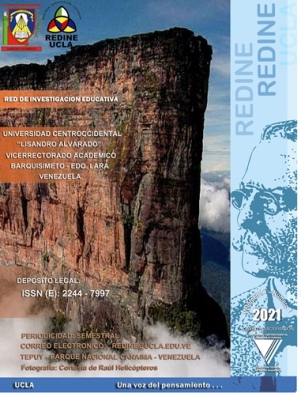Management performance of the educational council as emerging factor for school-family-community integration
Keywords:
Management performance, educational council, school-family-community integrationAbstract
In the present study, the Educational Performance of the Educational Council was analyzed as an emerging factor for the Community-School-Community integration. Developing under the positivist paradigm, with a quantitative approach, supported by a non-experimental field design of a descriptive nature. The population consisted of four hundred and thirty (430) people and for the sample, a technique called intentional sampling was used, consisting of sixty-one (61): two (2) managers, nine (9) teachers, nine (9) spokespersons students and forty-one (41) representatives, all members of Educational Council. The techniques used in this investigation were the survey and direct observation. Three questionnaires were applied; conformed by closed questions with alternative answers. The validity of the instruments was carried out through the review of three subject matter experts and the reliability was determined with the Cronbach's Alpha coefficient, reaching values of 0.9 for each of the instruments. It is concluded that there are coincidences in the opinions expressed by the subjects investigated, considering that the educational council is not working properly, which leads to a deficient process of School-Family-Community integration. It was also determined that the spokespersons are not fulfilling their responsibilities within the Educational Council.
Downloads
References
Asuaje, S (2014). Gerencia de los docentes de aula en la promoción de la integración de los representantes al proceso educativo de los estudiantes en la en la Escuela Bolivariana “Cerritos Blancos II. Trabajo de grado de maestría no publicado, Universidad Yacambú, Barquisimeto, Estado Lara.
Chiavenato, I. (2001).Gestión del talento humano. (1a. ed.). México: Mc Graw Hill.
Decreto No 1286 República de Colombia (27 Abril de 2005) Ministerio de Educación Nacional. Bogotá, D. C. artículo 6. [Documento en línea]. Disponible:http://www.mineducacion.gov.co/normatividad/1753/articles-85861_archivo pdf.pdf_ [Consulta: 2015, Septiembre 21].
Díaz, E. (2013). Rol del Director Como Promotor Social en la Conformación de los Consejos Educativos en Escuelas Primarias del Municipio Escolar N 9. [Documento en línea]. Disponible: http://200.35.84.131/portal/bases/marc/t exto/9217-13-07142.pdf [Consulta: 2015, Septiembre 23].
Hernández, J. (2012). Una guía rápida sobre los Consejos Educativos. [Documento en Línea] Disponible en: http://prodavinci.com/2012/10/26/actualidad/una- guia-rapida-sobre educativos-por-José-ignacio-hernandez-los-consejos/ [Consulta: 2015, septiembre 23].
Hurtado, I. y Toro, J. (1998) Metodología de la Investigación Holística (2a. ed.). Caracas: SYPAL.
González, J (2010). Los consejos escolares de los colegios de educación primaria analizados por sus miembros. Universidad Nacional de Educación a Distancia Madrid, España.
Ley Orgánica de Educación (2009). Gaceta Oficial de la República de Venezuela 5.929 (Extraordinaria) del agosto 15, 2009.
Loza, J.C. (2008). Integración escolar. [Documento en línea]. Disponible: [http/www.psicopedagogia.com/definición/integración%20escolar.html]. Consulta: 2016, septiembre 18].
Ministerio del Poder Popular Para la Educación. Resolución 058 (2012) Gaceta Oficial de la República de Venezuela, 40029(Extraordinario), octubre 16, 2012.
Ministerio del Poder Popular Para la Educación (2014). Directores y Consejos Educativos Una Alianza Para Una Educación de Calidad. [Datos en línea], Disponible:http://es.slideshare.net/RobertoAlvarado19/7-directores-y-consej-alianza-para-una-educaci-nde-calidad-52502899.[Consulta:2015, Octubre 05].
Ruiz, C. (1998). Instrumentos de Investigación Educativa. Procedimientos para su Diseño y Validación. Barquisimeto: Ediciones CIDEG, c. a.
Sabino, C. (2000). El Proceso de Investigación. Caracas: Panapo de Venezuela, C.A.
Schmelkes, S. (1994). Hacia una Mejor Calidad de Nuestras Escuelas. O.E.A. Colección Interamer.
Stoner, J. Freeman y Gilbet JR. (1996). Administración, (6ta.ed.), Traduce: Pilar Mascaró Sacristán, México: Prentice Hall.
Tamayo y Tamayo, M. (2003). El Proceso de la Investigación Científica. (4ta. Ed.). México. Limusa Noriega Editores.
Published
How to Cite
Issue
Section
Derechos del/de autor/es a partir del año de publicación
Esta obra está bajo la licencia:
Creative Commons Reconocimiento-NoComercial-CompartirIgual 4.0 Internacional (CC BY-NC-SA 4.0)
Las opiniones expresadas por los autores no necesariamente reflejan la postura del editor de la publicación ni de la UCLA. Se autoriza la reproducción total o parcial de los textos aquí publicados, siempre y cuando se cite la fuente completa y la dirección electrónica de esta revista. Los autores(as) tienen el derecho de utilizar sus artículos para cualquier propósito siempre y cuando se realice sin fines de lucro. Los autores(as) pueden publicar en internet o cualquier otro medio la versión final aprobada de su trabajo, luego que esta ha sido publicada en esta revista.




